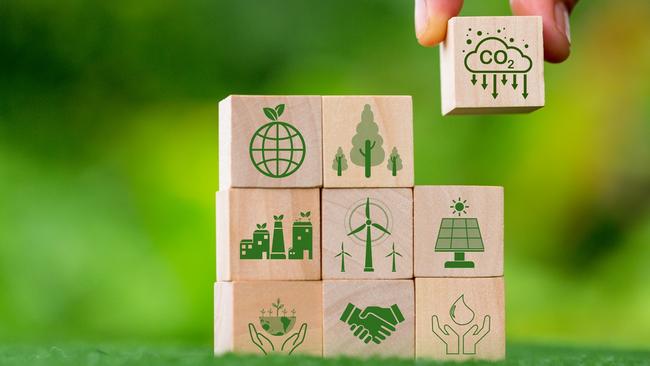Voluntary carbon credit demand to skyrocket, says EY
Voluntary carbon credit demand will increase by up to 12 times by 2035, says EY, despite the sector continuing to grapple with credibility issues.

Business
Don't miss out on the headlines from Business. Followed categories will be added to My News.
Global demand for voluntary carbon credits will increase by up to 12 times by 2035, pushing the price to $US75-$US125 ($113-$189) a tonne, EY says, while their use continues to grapple with credibility concerns.
A recently-released global EY report says there will be increasing pressure on businesses from external stakeholders to meet emissions reduction goals, which will drive strong demand for voluntary credits.
Voluntary credits purchased by organisations to meet voluntary goals, as opposed to compliance credits which are used to meet regulatory requirements, such as the use of Australian Carbon Credit Units under Australia’s Safeguard Mechanism.
The carbon credit sector globally has suffered from a credibility issue, however, which has led to Australian companies such as Fortescue and Telstra moving away from the use of voluntary credits and claims of carbon neutrality, towards direct action to reduce emissions.
Not all emissions can be abated through direct action, and EY predicts strong demand for credits to meet the needs of companies seeking to reduce emissions through the use of credits on a voluntary basis.
“Recent scrutiny has cast doubt on the integrity and verification of carbon credits, and the benefits provided to local communities,’’ EY says. “This has placed additional pressure on organisations, including EY, as they navigate evolving carbon management standards and stakeholder expectations.
“Given the essential role of carbon credits in avoiding dangerous climate change – and supporting a just transition – the challenge is to address current shortcomings while supporting the distinctive contributions of voluntary credit supply.
“This includes the benefits to host communities and countries.’’
Given the growing demand for credits coupled with a need for credibility, the market around carbon credits was evolving, EY says. “This challenge is being addressed by the Global Carbon Market Utility, which is currently establishing the necessary infrastructure to enable financial intermediaries, like banks and insurance companies, to enter the voluntary carbon market,’’ EY says. “Projects to improve data transparency and management, establish consistent approaches to contracts, audits, verification and dispute resolution are now under way.’’
EY said that while more than half of the world’s largest companies had set net-zero targets by the end of 2023, carbon credits “have not yet earnt their social licence’’. Article 6 of the Paris Agreement on climate change establishes a structure and framework to underpin the legitimacy and operation of carbon markets, but EY says progress on this front has been slow.
EY managing director climate change and sustainability services Rob Bradley said governments globally were grappling with issues such as whether to apply taxes or royalties to the sector, and what oversight was appropriate.
“There are those that hope carbon will be commoditised, where once you have printed a carbon credit you don’t care where it has come from,’’ he said.
“I don’t think that day will ever come. Other attributes of voluntary carbon credits are also vitally important to the narrative and value proposition – like the role they play in enriching communities, protecting vital ecosystems and conserving water.”
Projects under way such as the Voluntary Carbon Markets Integrity Initiative are making progress, but in general policy approaches across governments remain “extremely fragmented’’ making voluntary carbon markets hard to navigate.
EY’s analysis estimates carbon prices will rise from less than $US25 per tonne now to $US75-$US125 in 2035, and continue to rise to $US125-$US175 per tonne by 2050, in 2020 dollar terms.
“Our analysis finds that scaling up credit volumes will quickly exhaust available low-cost supply, driving rapid increases in credit prices to 2035 across all scenarios,’’ EY says.
The ACCU spot price is currently $37.90 per tonne.
Originally published as Voluntary carbon credit demand to skyrocket, says EY



